

Work Hard. Be Nice. - Education Next. From WORK HARD BE NICE by Jay Mathews.
This article is a summary of how and why 2 teachers started the KIPP charter school. – mariegaskins
(c) 2009 by Jay Mathews.
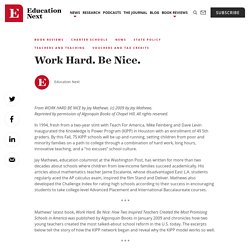
Book TV: Jay Mathews "Work Hard. Be Nice."
This a video of the author speaking about the book. You will need to click on the YouTube link to access the video. – mariegaskins
Training Teachers to Teach Critical Thinking.
This video talks about one of the strategies used at the KIPP school. KIPP school use the principles of the book. – mariegaskins
Reforming Our Schools: Nonacademic Support for Students is Essential. And then there's the no excuses crowd -- KIPP schools being one high profile example -- versus, for lack of a better term, the all excuses crowd.
As much as a no-excuse school is important this article talks about some of the issues. – mariegaskins
In other words, those who don't accept that poverty is an excuse for poor academic performance versus those who think that it dooms a child or school to low performance.

The Kipp Schools Model Us versus them debates are always concerning in general; they both ignore and hide the large field of gray between two very opposing positions, and they can often prevent us from having fruitful conversations in which real progress in education reform could be made. The no excuses debate has been particularly concerning recently. KIPP is getting lots of press thanks to a Mathematica study that found in general KIPP schools improve the academic performance of their largely disadvantaged student populations.
Why the concern? The secret? By Any Means Necessary (If you are interested in this topic, consider joining the Edutopia group Reform Starts Here.) Case Study: Culture at KIPP King Collegiate.
Talks about the four virtues at KIPP schools. We also see an interview with a student. – mariegaskins
Linda Cliatt-Wayman: How to fix a broken school? Lead fearlessly, love hard. Sir Ken Robinson: Do schools kill creativity?
Creativity is as important as literature. This Ted Talk explains how creativity is important in education. – mariegaskins
Sir Ken Robinson: Bring on the learning revolution!
Very good information about how we need to reform the education system. – mariegaskins
Sugata Mitra: The child-driven education. ED530059 - Charter School Autonomy: A Half-Broken Promise, Thomas B. Fordham Institute, 2010-May. For nearly two decades, charter founders have opened schools across the land on the basis of a distinctive education bargain: operational autonomy--freedom from restrictions typically placed on public schools--in exchange for strong results-based accountability.
This article discusses the autonomy of charter schools. I gives them a grade as to how they are doing. – mariegaskins
During that time, many have studied the "results" and "accountability" side of this arrangement, yet to everyone's knowledge there has never before been a systematic national appraisal of the autonomy side.
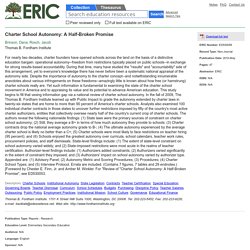
Despite the importance of autonomy to the charter concept--and notwithstanding innumerable anecdotes about various infringements on these freedoms--amazingly little is known about how free (or hamstrung) charter schools really are. Yet such information is fundamental to examining the state of the charter school movement in America and to appraising its value and its potential to advance American education. This study begins to fill that vexing information gap via a national review of charter school autonomy. Thomas B. 1393 138 1 SM. "In Real Life, You Have to Speak Up": The Civic Significance of No-Excuses Classroom Management Practices. 00131946.2011.
1.
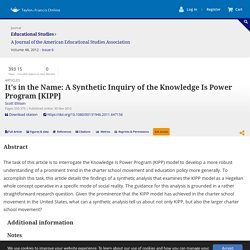
All such folktales should be taken with a healthy dose of salt. For example, the algorithm behind Google came from research conducted at Stanford University under a grant from the National Science Foundation. MIT Press Journals. 02680939.2014. "The Psychological Resilience of Spousal Caregivers of Multiple Scleros" by Marisa Diane Diaz. Abstract The purpose of this quantitative study was to examine an under-researched topic: the relationship between psychological resilience and personal growth with spousal caregivers of patients diagnosed with Multiple Sclerosis (MS).
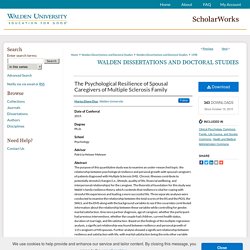
Chronic illnesses contribute to potentially stressful changes (i.e., lifestyle, quality of life, financial wellbeing, and interpersonal relationships) for the caregiver. The theoretical foundation for this study was Walsh's family resilience theory, which contends that resilience is vital for coping with stressful life experiences and leading a more successful life. Recommended Citation Diaz, Marisa Diane, "The Psychological Resilience of Spousal Caregivers of Multiple Sclerosis Family" (2015).
Accountability and Flexibility in Public Schools: Evidence from Boston's Charters And Pilots * We use cookies to enhance your experience on our website.By continuing to use our website, you are agreeing to our use of cookies.
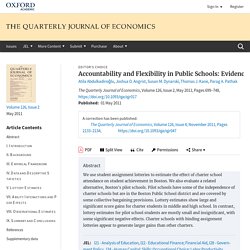
You can change your cookie settings at any time. <a href=" Find out more</a> Skip to Main Content Search Close Advanced Search Search Menu Article Navigation Volume 126 Issue 2 May 2011 Article Contents Editor's Choice Accountability and Flexibility in Public Schools: Evidence from Boston's Charters And Pilots * Atila Abdulkadiroğlu, Atila Abdulkadiroğlu.